Have you ever wondered how the world really views nurses? With healthcare growing more complex and in demand, nurses aren’t just caregivers—they are essential pillars of medicine.
So, is nursing a respectable career? Absolutely. Around the globe, nursing consistently ranks among the most trusted and valued professions. Nurses spend countless hours at patients’ sides, offer emotional support, and play a critical role in improving outcomes.
In this article, we’ll explore how society perceives nursing, why it’s so valued, and the respect nurses receive compared to other healthcare professionals.
Is Nursing a Respectable Career? A Deep Look Into the Considerable Factors
1. Public Perception of Nursing as a Profession
Surely you decided to become a nurse seeing their respect. But the real question is, when people think of nurses, what comes to mind? Compassion, dedication, or expertise? Nursing has long been considered one of the most trusted and respected professions worldwide.
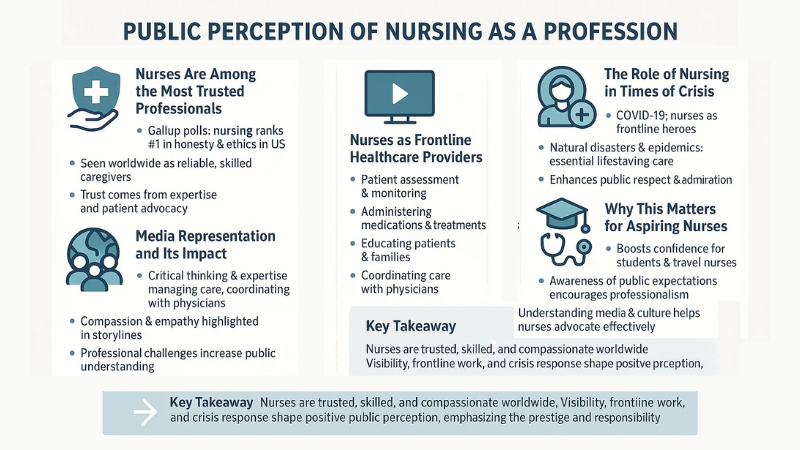
But the reasons behind this perception are multi-layered. Understanding how the public views nursing can help aspiring nurses, including travel nurses, appreciate the importance and impact of their career.
Nurses Are Among the Most Trusted Professionals
Across multiple surveys and studies, nurses consistently rank at the top of trusted professions:
- In the United States, Gallup polls show that nursing ranks number one in honesty and ethical standards year after year, often surpassing doctors, pharmacists, and teachers.
- Worldwide, nurses are seen as reliable and dependable caregivers, especially in cultures where personal attention and hands-on care are highly valued.
This trust comes from the fact that nurses are not only skilled healthcare providers but also patient advocates. Families often rely on nurses to explain complex medical procedures, answer questions, and provide emotional support during difficult times.
Media Representation and Its Impact
Movies, TV shows, and social media have significantly shaped public perception of nurses. While some portrayals rely on outdated stereotypes, many modern depictions highlight:
- Critical Thinking and Expertise:
Nurses are shown managing patient care, coordinating with physicians, and making life-saving decisions.
- Compassion and Empathy:
Emotional support and patient advocacy are central to nursing storylines.
- Professional Challenges:
Portraying nurses dealing with long hours, high stress, and complex cases increases public understanding of the profession’s demands.
For example, shows like Grey’s Anatomy or Chicago Med have introduced audiences to the intensity, skill, and dedication required in nursing roles, helping reinforce respect for nurses in real-life settings.
Nurses as Frontline Healthcare Providers
Nurses are often the first point of contact in hospitals, clinics, and long-term care facilities. They perform critical duties such as:
- Patient assessment and monitoring
- Administering medications and treatments
- Educating patients and families about care plans
- Coordinating with physicians and other healthcare professionals
Because nurses are present at every stage of patient care, the public sees them as the backbone of the healthcare system. This visibility reinforces trust, as patients experience firsthand the knowledge, reliability, and care that nurses provide daily.
The Role of Nursing in Times of Crisis
Public perception of nurses is also influenced by their response during health crises:
- During the COVID-19 pandemic, nurses were hailed as heroes worldwide for their tireless work on the front lines, often in high-risk environments.
- In natural disasters, epidemic outbreaks, or emergency situations, nurses often provide essential care when other systems are overwhelmed.
These high-stakes roles enhance respect and admiration for the profession, showing that nursing goes beyond routine care to critical life-saving responsibilities.
Cross-Cultural Perspectives
Perception of nursing can vary globally:
- United States & Europe:
Nurses are highly respected, and their education and professional standards are emphasized.
- Asia:
In many countries, nursing is traditionally viewed as a female-dominated, caring profession, sometimes undervalued compared to physicians, though modernization and higher education are improving recognition.
- Developing Countries:
Nurses may face resource challenges, but communities often value their accessibility, practical knowledge, and dedication.
Understanding these cultural differences is especially important for travel nurses who work in diverse settings and interact with patients from various backgrounds.
Why This Matters for Aspiring Nurses
- Knowing that nursing is highly respected can boost confidence for students or RNs considering travel nursing or advanced specialties.
- Being aware of public expectations encourages nurses to maintain professionalism, excellent communication, and compassionate care.
- Recognizing the role of media and culture helps nurses navigate patient perceptions and advocate for the profession effectively.
2. Is Nursing Considered a Good Career Path?
If you’re exploring long-term options in healthcare, you’ve probably asked yourself: “Is nursing considered a good career path?” The short answer is yes — and there are several reasons why nursing continues to be one of the most respected and rewarding professions.
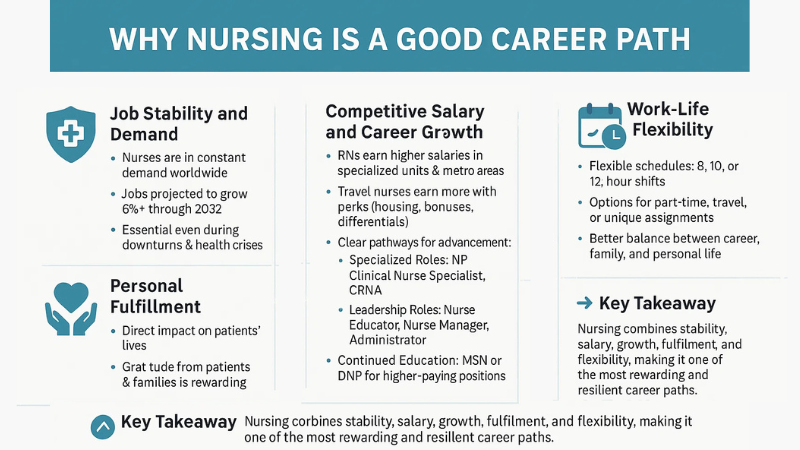
Job Stability and Demand
Nurses are in constant demand worldwide. Hospitals, clinics, long-term care facilities, and even travel nursing agencies rely on qualified nurses to keep healthcare systems running smoothly. According to the U.S. Bureau of Labor Statistics, nursing jobs are projected to grow 6% or more through 2032, faster than the average for all occupations.
Even during economic downturns or public health crises, nurses remain essential. This stability makes nursing a secure career path for those looking for long-term employment.
Competitive Salary and Career Growth
Nursing offers competitive pay, which varies depending on location, experience, and specialty. For example:
- Registered Nurses (RNs) earn higher salaries in metropolitan areas and specialized units like ICU, ER, or surgical nursing.
- Travel nurses often earn higher pay rates than permanent staff, with additional perks like housing stipends, sign-on bonuses, and shift differentials.
Moreover, nursing provides clear pathways for advancement:
- Specialized Roles:
Nurse Practitioner, Clinical Nurse Specialist, Certified Registered Nurse Anesthetist (CRNA)
- Leadership Roles:
Nurse Educator, Nurse Manager, or Nurse Administrator
- Continued Education:
Advanced degrees like MSN or DNP can open doors to higher-paying and more influential positions
This combination of earning potential and upward mobility makes nursing not only a stable career but a profitable and flexible one.
Personal Fulfillment
Few careers offer the direct impact on people’s lives that nursing does. From comforting patients in moments of fear to witnessing recoveries, nurses experience a level of personal satisfaction that’s hard to match. Many nurses describe the gratitude from patients and families as one of the most rewarding aspects of their job.
Additionally, nursing allows for variety and growth: you can work in different specialties, settings, or even travel across the country as a travel nurse, keeping your career dynamic and engaging.
Work-Life Flexibility
While nursing can be demanding, it also offers flexible scheduling options. Depending on your role, you might work 8-hour, 10-hour, or 12-hour shifts, pick up travel assignments, or even choose part-time schedules. This flexibility makes it easier to balance career, family, and personal pursuits.
3. Respect Levels for Nurses Compared to Doctors
When discussing healthcare professions, a common question arises: how do nurses measure up in terms of respect compared to doctors? While both roles are crucial, the sources and nature of respect they earn often differ.
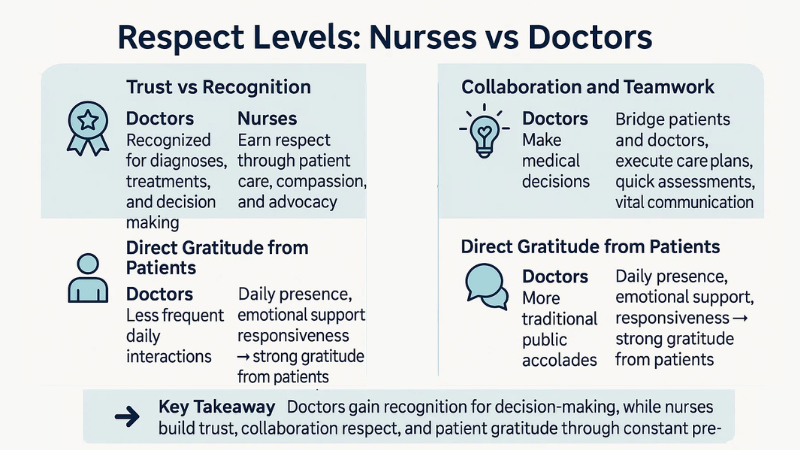
Trust vs Recognition
Doctors are often recognized for their diagnoses, treatments, and medical decision-making, which can place them in the spotlight. Nurses, on the other hand, earn respect through consistent patient care, attention to detail, and advocacy.
- Patients may not always notice the complexity of a doctor’s treatment plan, but they feel the impact of a nurse’s compassion and vigilance every day.
- From monitoring vital signs to administering medications and educating patients, nurses demonstrate a level of care that builds deep trust and appreciation.
Collaboration and Teamwork
Nurses and doctors work together closely in hospitals, clinics, and other healthcare settings. This collaboration highlights an important point about respect:
- Nurses often serve as the bridge between patients and doctors, ensuring that care plans are properly executed.
- Their role requires both technical skill and critical thinking, as they make quick assessments and communicate crucial information to physicians.
- Doctors may make the medical decisions, but nurses ensure those decisions translate into safe and effective patient care — earning respect from colleagues in the process.
Direct Gratitude from Patients
One of the unique ways nurses earn respect is through direct patient interaction:
- Patients spend more time with nurses than with doctors during their hospital stay.
- The consistent presence, emotional support, and responsiveness foster a personal connection.
- This hands-on care often translates into greater personal gratitude and appreciation, sometimes even more tangible than recognition given to doctors.
Professional Recognition
While doctors might traditionally receive more public accolades, nurses are increasingly being recognized for their critical contributions:
- Awards like the DAISY Award for Extraordinary Nurses honor nurses who go above and beyond in patient care.
- Hospitals and healthcare organizations highlight nurse achievements, reinforcing that respect in nursing is earned through expertise, compassion, and reliability.
4. Why Society Values the Nursing Profession
Nursing is more than just a job — it’s a profession that touches lives in profound ways. So, why does society continue to hold nurses in such high regard across cultures and communities?
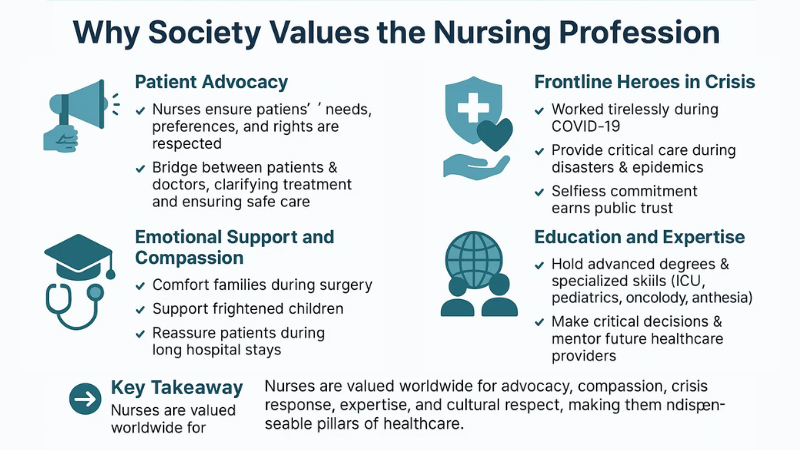
Patient Advocacy
One of the most important reasons nurses are valued is their role as patient advocates:
- Nurses ensure that patients’ needs, preferences, and rights are heard and respected.
- They act as a bridge between patients and doctors, clarifying treatment plans, asking questions on behalf of patients, and making sure care is delivered safely and effectively.
- This advocacy builds trust not only between the patient and healthcare system but also between society and the nursing profession as a whole.
Emotional Support and Compassion
Nurses provide more than medical care; they offer emotional support that patients and families often rely on during difficult times:
- Comforting a family while their loved one undergoes surgery
- Holding the hand of a frightened child before a procedure
- Listening to patients’ fears and providing reassurance during long hospital stays
This combination of clinical expertise and human compassion is a defining reason society values nurses. Patients remember the care, empathy, and attention nurses provide long after leaving the hospital.
Frontline Heroes in Crisis
Nurses consistently demonstrate their importance during emergencies and public health crises:
- During the COVID-19 pandemic, nurses worked tirelessly on the frontlines, often risking their own health to save others.
- In natural disasters, epidemics, or mass casualty events, nurses provide critical care, coordination, and emotional support, reinforcing their role as indispensable professionals.
- Their visibility and selfless commitment in such high-stakes situations enhance public admiration and trust.
Education and Expertise
Beyond bedside care, nurses are highly trained professionals:
- Many hold advanced degrees, certifications, and specialized skills in areas like ICU, pediatrics, oncology, and anesthesia.
- Their expertise allows them to make critical decisions under pressure, guide patients through complex treatment plans, and mentor future healthcare providers.
This combination of skill, compassion, and advocacy makes nursing a profession valued not only by patients but by society at large.
Cross-Cultural Respect
Across the globe, nurses are recognized as essential pillars of healthcare:
- In Western countries, they are seen as highly skilled professionals critical to patient outcomes.
- In many Asian countries, nursing is respected for its role in caregiving and community health, even if traditionally undervalued compared to physicians.
- Globally, nurses symbolize trust, reliability, and compassionate service, making them universally respected.
5. How Nurses Are Viewed in Different Cultures
Nurses play a vital role worldwide, but respect, recognition, and professional status can vary depending on cultural and healthcare contexts. Understanding these differences can help aspiring nurses appreciate the global significance of the profession.
Western Countries
In countries like the United States, Canada, the UK, and Australia, nurses are often seen as highly skilled professionals with significant autonomy:
- Trust and Recognition:
Surveys show nurses rank consistently high in honesty, ethical standards, and public trust.
- Professional Autonomy:
Nurses are empowered to make critical patient-care decisions, particularly in specialized roles like nurse practitioners or clinical nurse specialists.
- Public Image:
Media portrayals generally emphasize competence, compassion, and dedication, which reinforces the profession’s positive image.
Asian Countries
In nations such as Japan, South Korea, and India, nurses are respected but operate within structured hierarchical systems:
- Hierarchical Work Culture:
Nurses often follow strict protocols and report to physicians, which can limit decision-making independence.
- Social Respect:
Nursing is traditionally seen as a caring and honorable profession, though public recognition may be lower compared to doctors.
- Opportunities:
Advanced roles and leadership positions are growing, especially as healthcare systems modernize and value specialized nursing education.
Developing Regions
In many developing countries, nurses face unique challenges:
- Resource Constraints:
Limited supplies, understaffed facilities, and high patient loads can affect public perception.
- Critical Impact:
Despite challenges, nurses’ dedication often earns them immense respect in communities where access to healthcare is scarce.
- Community Recognition:
Nurses frequently act as both caregivers and educators, strengthening public trust and admiration at the local level.
Universal Themes
While the level of formal recognition varies, certain qualities are universally appreciated:
- Compassion and empathy toward patients
- Dedication to care even under difficult circumstances
- Professionalism and reliability
These traits ensure that nurses are valued globally, regardless of cultural or systemic differences.
6. Challenges That Affect Respect for Nurses
Nursing is widely respected, but like any profession, it faces barriers that can influence public perception and professional recognition. Understanding these challenges helps both aspiring and current nurses navigate their careers while advocating for the profession.
Misconceptions About Skill Level
Despite their critical role, some people still misunderstand the complexity of nursing:
- Nursing is sometimes seen as a “less skilled” job compared to physicians, even though it requires extensive clinical knowledge, decision-making, and specialized skills.
- Tasks like patient assessment, medication administration, and emergency response may be underappreciated by the general public.
- Education and outreach programs, like public awareness campaigns, help highlight the expertise nurses bring to healthcare.
Understaffing and Burnout
Overwork and staffing shortages can indirectly affect respect for nurses:
- When hospitals are understaffed, nurses may struggle to provide timely attention to every patient, which can impact perceptions of care quality. And for this, they have to work longer than their shifts. Standing for this long results in nurse burnout from footwear.
- Burnout is a real concern, leading to fatigue, stress, and sometimes reduced patient interaction.
- Supporting nurses through proper staffing, mental health resources, and professional development is crucial to maintaining both care quality and public trust.
Gender Stereotypes and Historical Bias
Nursing has historically been female-dominated, which can influence how the profession is viewed:
- In some cultures, male nurses may face stereotypes or assumptions about their roles.
- Similarly, female nurses may encounter biases regarding authority, leadership, or decision-making.
- Modern nursing emphasizes competence over gender, and highlighting achievements and leadership roles helps break outdated stereotypes.
Education and Public Awareness as Solutions
Many of these challenges can be addressed through education and advocacy:
- Community outreach programs can explain the critical skills and responsibilities of nurses.
- Media and professional organizations can showcase nurses’ roles in complex patient care, research, and leadership.
- Mentorship and visibility in leadership positions also enhance societal respect for the profession.
7. Future Outlook: The Rising Status of Nursing
The respect and professional status of nurses is on the rise, thanks to evolving healthcare systems, advanced education, and growing recognition of their critical roles. Here’s a closer look at why nursing is gaining even more prominence:
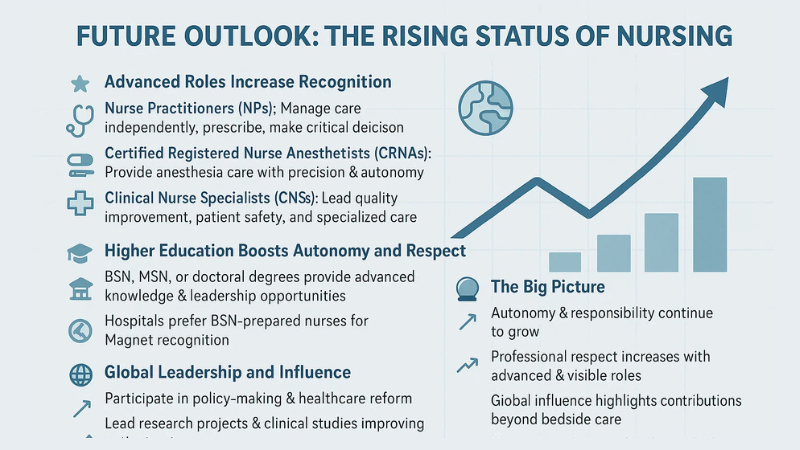
Advanced Roles Increase Recognition
Modern nursing offers specialized roles that bring higher responsibility and visibility:
Manage patient care independently in many states, prescribing medications and making critical decisions.
Provide anesthesia care with high precision and autonomy.
Lead initiatives in quality improvement, patient safety, and specialized care areas.
These advanced roles showcase nurses’ expertise and elevate their standing within healthcare teams and society.
Higher Education Boosts Autonomy and Respect
Nurses who pursue BSN, MSN, or doctoral degrees gain not only advanced knowledge but also greater professional autonomy:
- Higher education equips nurses to take leadership positions, manage healthcare teams, and contribute to policy-making.
- Hospitals increasingly prefer BSN-prepared nurses for Magnet-recognized facilities, linking education with institutional respect.
- Doctoral-prepared nurses influence research, clinical guidelines, and healthcare innovation, further solidifying their professional status.
Global Leadership and Influence
Nurses are no longer confined to bedside roles—they are becoming leaders and change-makers worldwide:
- Participating in policy-making and healthcare reform
- Leading research projects and clinical studies that improve patient outcomes.
- Innovating in areas like telehealth, community care, and public health programs.
This global leadership highlights how nursing has evolved from a supportive role to an essential pillar in healthcare systems everywhere.
The Big Picture
The future of nursing is bright:
- Autonomy and responsibility continue to grow.
- Professional respect is increasing as nurses take on advanced and visible roles.
- Global influence ensures that nurses are recognized not just for bedside care but for their contributions to policy, research, and innovation.
Conclusion
So, is nursing a respectable career? Without a doubt. Nurses are trusted, valued, and essential across the world.
Despite challenges like burnout or misconceptions, their skill, compassion, and dedication continue to earn respect every day.
If you’re considering nursing, remember it’s more than a job—it’s a career that allows you to make a lasting impact.
FAQs: Is Nursing a Respectable Career
Is nursing respected more than other healthcare jobs?
Yes, surveys often place nursing at the top for trust and ethics, even above many other healthcare professions except doctors.
Why are nurses considered trustworthy?
Because they consistently demonstrate compassion, accountability, and patient-centered care.
Is nursing a good career for long-term growth?
Absolutely. Nurses can specialize, pursue advanced practice roles, and even move into administration or research.
Do doctors respect nurses equally?
In most collaborative environments, yes. Respect may vary by culture or institution, but teamwork is key.
How does culture affect respect for nurses?
Cultural norms influence hierarchy, gender expectations, and perceived value, creating differences globally.

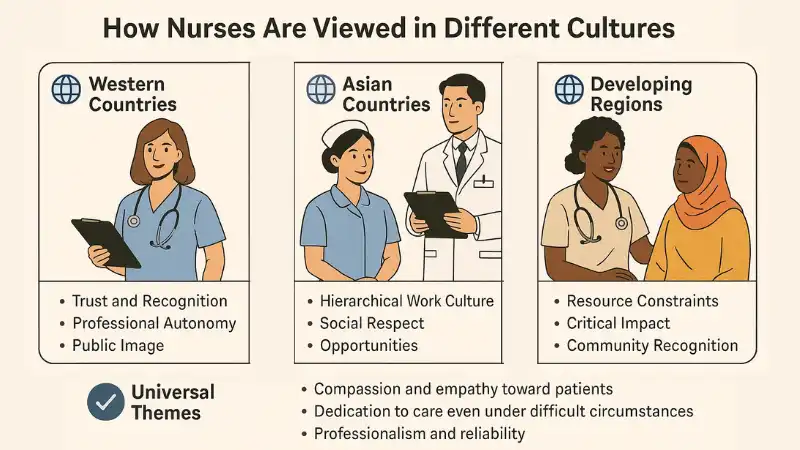
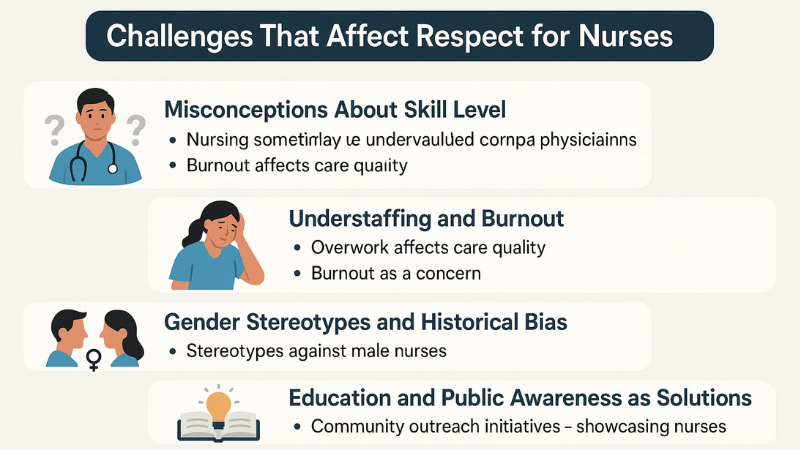
Leave a Reply